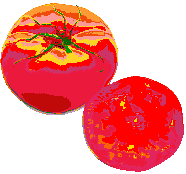PSA Rising Magazine | Eating Well
Tomato Power

Antonio's Tomato Sauce
Salsa
di Pomodoro
(Italian language version)
Scientific
Studies
with links to abstracts
Men who eat ten or more servings of tomatoes a week cut their risk of prostate cancer by 45 percent. This was the finding of a six-year Harvard study of 47,000 middle-aged men.
Most of the protection came from eating spaghetti sauce, said Dr. Edward Giovannucci of the Harvard School of Public Health. Pizza helped too. "We found that more was better,'' said Giovannucci. Men who usually ate only four to seven servings of the tomato-based food had only a 20 percent reduction in the rate of prostate cancer. The result for tomatoes was clear, Dr. Giovannucci said, because the benefit was shown in four forms of the food.
Tomatoes are rich in lycopene, which gives them their distinctive red color. Lycopene is a powerful antioxidant, more potent than beta-carotene. The lycopene molecule may act to block the initiation of the cancerous process.
Prostate cancer is less common in southern Mediterranean countries, such as Italy and Greece, where tomato sauce is a staple in everyday cooking. According to the Harvard study, cooked tomato seemed to be more protective than juice or raw tomatoes.
Lycopene is fat-soluble. This means we need to eat tomatoes that have been cooked or canned using a small amount of oil. Vine-ripened summer tomatoes are richer in lycopene than those ripened after picking. Eat them sliced or diced and sprinkled with oil and vinegar. Year round, eat tomato sauce, tomato paste, tomato soup -and ketchup.

Antonio's Tomato Sauce
I read about lycopene in tomatoes a couple of years ago.... I make a pseudo-marinara tomato sauce, which is as healthy as I can do. When we have fresh tomatoes, it's even better.
Here's a recipe for all to enjoy.
Two or three large to medium onions finely chopped.
Garlic, about 2 Tbs, chopped (Elizabeth and I say, garlic is enough when
you are sick of peeling it).
In a wok, put onion and garlic with enough olive oil (about 2 to 3 Tbs).
Sautee until the onion is transparent and the garlic lightly colored.
 Meanwhile chop the peeled tomatoes of one can (28oz, weight). Put the
juice aside, and stir the tomatoes in the wok. Let it sautee while you
open a can (28 oz) of tomato puree (not sauce). Mix the puree in the wok,
and use the saved juice to get all the puree from the can (a little white
wine may be handy).
Meanwhile chop the peeled tomatoes of one can (28oz, weight). Put the
juice aside, and stir the tomatoes in the wok. Let it sautee while you
open a can (28 oz) of tomato puree (not sauce). Mix the puree in the wok,
and use the saved juice to get all the puree from the can (a little white
wine may be handy).
Add basil and oregano to taste, let everything finish
simmering for about 10 minutes, and you can use the sauce on spaghetti,
tortellini, gnocchi, etc. I store the leftover sauce in 8 oz plastic containers,
in the freezer. I get about 5 containers, each one just fine for 2 people's
dinner. It takes about half an hour to prepare, and lasts us for about
five days. Good return on the investment!
Ciao to everybody, and my love to all of you.
Antonio
Amo la Vita. La Vita mi e' amica.
I love Life. Life is friendly to me.
Scientific
Studies
The Harvard study followed 47,000 male health professionals between the
ages of 40 to 75. The first survey was taken in 1986 and the men were
periodically re-examined. By 1992, 812 men in the study had prostate cancer.
The researchers found that these men had eaten fewer tomato-based foods
than men who had not developed prostate cancer.
These findings have been confirmed and expanded at Dana Farber Cancer Institute in the USA and also in Milan, Italy and in Dusseldorf, Germany.
References
Live links to abstracts at PubMed,
the National Library of Medicine search service. PubMed lets you access
the 9 million citations in MEDLINE and Pre-MEDLINE (with links to participating
on-line journals) and other related databases.
Giovannucci, E., et al. Intake
of carotenoids and retinol in relation to risk of prostate cancer.
J Natl Cancer Inst 1995 Dec 6;87(23):1767-1776
Clinton SK, et al.cis-trans
lycopene isomers, carotenoids, and retinol in the human prostate.
Cancer Epidemiol Biomarkers Prev 1996 Oct;5(10):823-833 Dana-Farber Cancer
Institute, Harvard Medical School, Boston, Massachusetts 02115-6084, USA.
Gartner C, et al.
Lycopene is more bioavailable from tomato paste than from fresh tomatoes.
Am J Clin Nutr. 1997 Jul; 66(1): 116-122.
Gerster, H.
The potential role of lycopene for human health Journal of
the American College of Nutrition 1997 Apr;16(2):109-126 [Research sponsored
by Vitamin Research Department, F. Hoffmann-La Roche Ltd, Basel, Switzerland].
Levy, J., et al.
Lycopene is a more potent inhibitor of human cancer cell proliferation
than either alpha-carotene or beta-carotene. Nutrition and Cancer
1995; 24(3): 257-266.